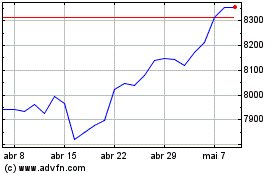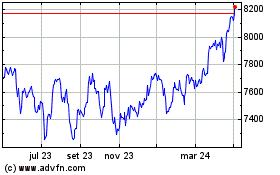Global Stocks Weaken Ahead of New Round of U.S.-China Trade Talks
20 Março 2019 - 7:55AM
Dow Jones News
By Avantika Chilkoti
Global stocks sagged Wednesday as investors remained cautious
ahead of another round of high-level trade talks between the U.S.
and China planned for next week.
In Europe, the Stoxx Europe 600 was down 0.4% in morning
trading. Hong Kong's Hang Seng Index was down 0.5% and the Shanghai
Stock Exchange was marginally lower too.
Futures pointed to a modest opening uptick in the U.S. of 0.1%
for both the Dow Jones Industrial Average and the S&P 500.
On Tuesday, it emerged that Trade Representative Robert
Lighthizer and Treasury Secretary Steven Mnuchin planned to fly to
Beijing next week, with Chinese negotiators heading to Washington
after that, in what is being framed as a final push to close a
trade deal between the world's two largest economies.
Many analysts attributed the rally in equity markets in 2019 to
high hopes for U.S.-China negotiations. Sentiment around the talks
had dimmed in recent days as reports suggested major issues
remained on the table.
Some analysts, like Liz Ann Sonders, chief investment strategist
at Charles Schwab, have flagged concerns that any new trade deal
might be a "deal light"--an agreement that allows the U.S.
administration to "take a victory lap" but doesn't tackle issues
such as intellectual property theft.
"The algorithmic trading has been highly correlated to news on
trade, so if you wanted to point to a fundamental driver of this, a
lot of it is hope for a trade deal," said Ms. Sonders, adding that
markets are already pricing in good news from the talks.
The WSJ Dollar Index, which tracks the greenback against a
basket of 16 currencies, was down 0.1% Wednesday. The 10-year U.S.
Treasury edged down to 2.596%, from 2.614% Tuesday. Yields move
inversely to prices.
Later Wednesday, the U.S. central bank will release its economic
forecasts, and Chairman Jerome Powell's press conference will be
watched for signals on future monetary policy and the strength of
the U.S. economy.
Global markets have been in flux in recent weeks as investors
digested a slew of conflicting economic data from the U.S.,
including disappointing payroll and inflation figures. Many
analysts are questioning how long the U.S. will continue to grow as
the effects of the Trump administration's generous tax policies
wear off.
"At the same time you saw an administration provide all this
fiscal stimulus, they basically offset it by launching a trade
war," Ms. Sonders said. "So we're in uncharted territory in trying
to gauge the impact it's going to have on earnings, the economy, on
animal spirits and confidence."
Meanwhile, in the U.K., many analysts are expecting the Brexit
deadline to be extended beyond the end of March as Prime Minister
Theresa May struggles to craft a deal that is palatable to both
Westminster and Brussels.
Analysts at Rabobank called the situation "out of control" and
warned that markets could have become "complacent" about the
chances that the U.K. could come tumbling out of the block without
an agreement, triggering a selloff in the British pound.
"In the coming days faith amongst traders in an ability of U.K.
[members of Parliament] to make rational decisions could fade
rapidly and cause a major selloff," they said in a recent note to
clients.
The pound fell 0.3% against the U.S. dollar Wednesday to
$1.3229. The FTSE 100 index, which is dominated by large
international businesses, dropped 0.1% while the FTSE 250 was
nearly flat.
In commodities, global benchmark Brent crude oil was also nearly
flat at $67.59 per barrel.
Write to Avantika Chilkoti at Avantika.Chilkoti@wsj.com
(END) Dow Jones Newswires
March 20, 2019 06:40 ET (10:40 GMT)
Copyright (c) 2019 Dow Jones & Company, Inc.
FTSE 100 (FTSE:UKX)
Gráfico Histórico do Índice
De Mar 2024 até Abr 2024

FTSE 100 (FTSE:UKX)
Gráfico Histórico do Índice
De Abr 2023 até Abr 2024
